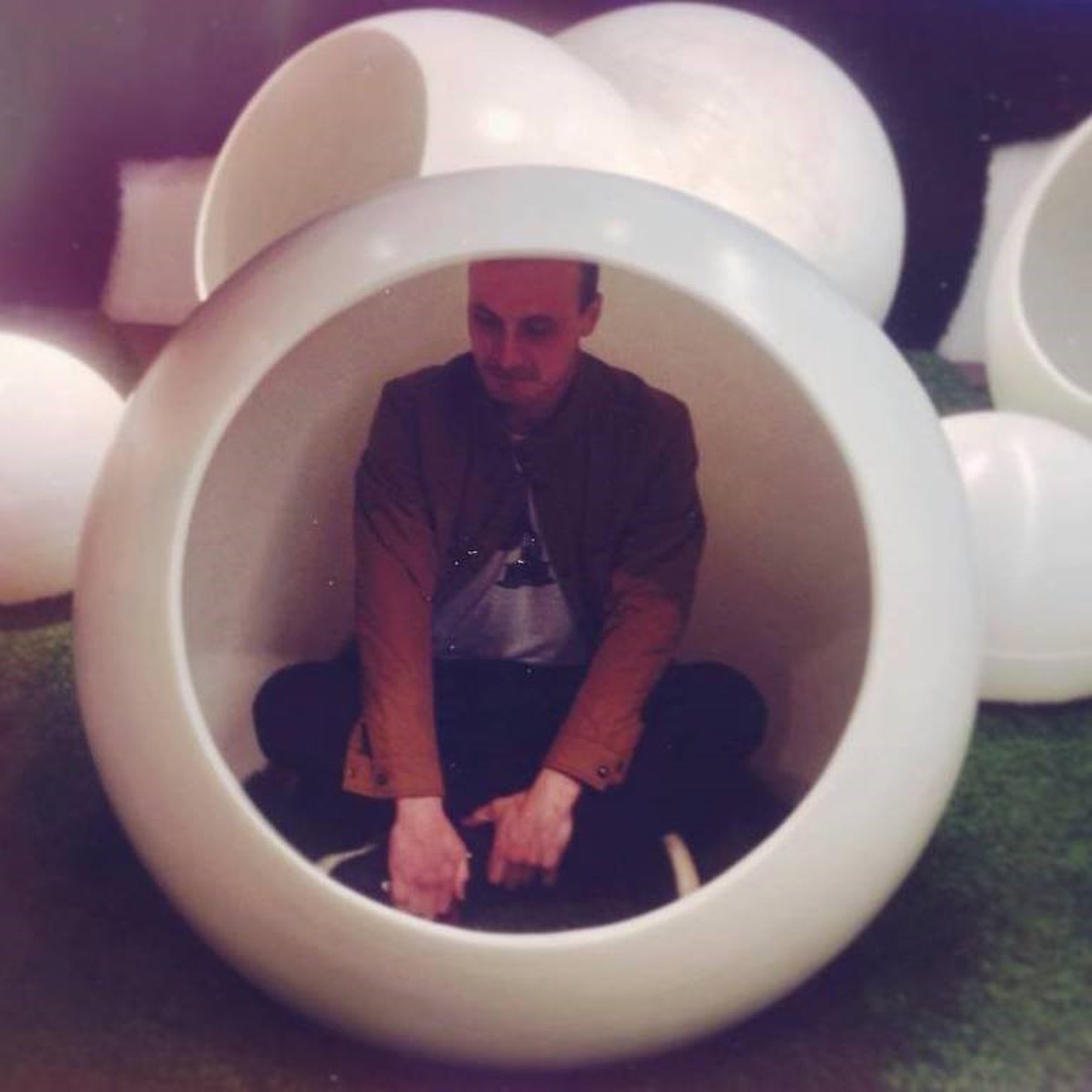In 2007, Samuel Brightman Glover had his first manic-depressive episode. He says it rocked his world.
At the time, the frontman for funk band Natural Selection was working on the group’s debut, Lasers in the Jungle; the mood swing was the beginning of his topsy-turvy relationship with his bandmates.
“There are so many elements you have to control in having a band,” Glover says. “Keeping it all together stressed me out so hard that I’d have mental breakdowns. ... It’s like, ‘It’s not worth it.’ I love music. It was really fun when I wasn’t freaking out, and I’m really glad I did it. But I just reached a cracking point. I just didn’t have the help I needed to get to another level, as far as an agent or anything like that [goes]. I just spread myself too thin, but then I realized it takes...not insanity, but that craving to constantly want to put yourself out there and do tons of shows. It’s just not as appealing, because I’d rather have a quiet night at home.”
By 2010, Glover had broken up with the group and had stopped performing in public. He began to focus instead on writing and producing songs. He’s continued to make his own music ever since, including the brand-new Similar Mystic, an alt-pop collection on which he plays most of the instruments. Glover also recorded, produced and released the album himself, on Bandcamp. He originally gave himself two years to complete the project, but then, he says, the music flooded in, and he didn’t want to wait to release it.
“I think the best way to write music is to be a conduit,” Glover says. “For me, working on changing the process helps me be a better conduit for the music. Lyrics will just flow out all at once with the music, too. That’s not always the case, but sometimes that’s how it manifests itself. When I’m in the zone, it just channels through me. And all that is just raw stream-of-consciousness and raw emotion.”
During his Natural Selection days, Glover’s vocals recalled Steely Dan’s Donald Fagan; they worked seamlessly with the band’s high-energy dance funk. But on Similar Mystic, there’s a hint of fragility in his delivery, which works better with the emotional depth of some of the album’s lyrics.
“There’s tons of music that just hits those notes from the music itself, but lately I’ve heard people kind of spilling their hearts out and making it audible without putting all these delays and reverbs on things,” Glover says. “I’m not discounting modern music in any way; I’m just saying that that’s something I’d like to hear.”
On “Wouldn’t It Be Nice,” he sings, “Just a slice of paradise with you and me at the center of it all.” Although a lot of the song is metaphorical, he admits that he’s struggled with relationships in the past.
“I almost put them on display in lyrics and things like that,” he says. “I guess also the chorus [here] is a statement: ‘Wouldn’t it be nice if we didn’t have all these problems? We rolled the dice, and we are the ones.’ It’s not necessarily talking about a person, but maybe even a community or state of mind or something.”
“Wouldn’t It Be Nice” also contains the line “Beauty, it sometimes comes from pain,” which alludes to his experience with bipolar disorder.
“I have pretty hard episodes about two times a year,” says Glover, who’s lived in Denver full-time since 2013. “So I have to build a skill set of dealing with that and kind of having to radically expect it, and sometimes...not change it, but be like, ‘This is how I am.’ So that anguish in my music, it comes from that. It’s really difficult, and it’s not something that people talk about as a skill set to have, to deal with mental health struggles. [We’re] just starting to break the ice in talking about mental health, and there’s this whole thing, like, ‘How do you live with it day to day?’ It’s tough. It’s a unique struggle, and not everybody can even relate to what it’s like.”
Over the past decade of dealing with his illness, Glover has also had to work on getting his identity back.
“It’s just crazy, because it took me so long to reclaim my identity,” he says. “Something deep like that, it starts to get at you and say, ‘Hey, this is you now, and it’s always going to be like this.’ For me, it’s a part of me, but now I don’t let it be the whole of me.”
Delving into music and drawing has helped Glover during his depressive episodes, which can come and go every few weeks, and some of that darkness seeps into his music.
“I’m not immune to depression, but I’m used to certain aspects of it. It doesn’t hit me as hard, or at least as hard as it used to,” he says.
Glover practices Zen to calm himself, and the song “Here & Now” looks at a Zen way of thinking.
“For me, it’s a coping mechanism,” Glover explains, “like when I have to be able to push everything out and just recenter myself.”
With each new project Glover starts, he likes to go in a new direction; fresh passion helps him complete his works.
“I feel like now, as I move forward, the music’s a little more mature,” he says. “It doesn’t really have that in-your-face pop vibe. I like the word ‘contemplative.’”
Glover says that when he enters into a creative space, it’s a bit like a riddle, but it’s a spiritual place, too. “It’s a place where those raw emotions and talking too much maybe about heartache — it comes out of that place. When I do these things, I do it at the same time every day. It’s like a meditation process, as well.”
Some of the tracks on Similar Mystic, like synth-pop opener “Imaginary Colors,” feel almost like they could have been created using software such as Ableton Live, but Glover says he took an old-school approach, cutting things up in Pro Tools and looping analog drum sequences, which created a more organic feel. While Glover has a ribbon microphone that he uses for recording his vocals on most of the songs, he recorded other vocal tracks using the internal microphone on his MacBook.
“It sounded shitty at first, but I just threw EQ on it, and it was a unique sound,” he says. “You won’t get that with a regular microphone. I thought that was kind of funny. You could spend all the money on a mic, [but] I actually like the little mic on the laptop.”
Similar Mystic closes with the funk-centric “Fabric of the Cosmos,” which may be the closest thing to Natural Selection on the album.
“It’s still in there, just not as tapped as it used to be,” Glover says of that particular sound. “The energy that was in the music, I did that on purpose. It was because the people in the band kind of had that funk dynamic, [and] that’s still a part of me. I just try to write in a way that challenges me. You can’t always do the same genre.”
Glover says that after he makes albums, he rarely goes back and listens to them.
“I don’t know if that’s just because I can see all my shortcomings, or if those songs were me dealing with me, what I was going through at the time, and I just don’t want to have to listen to them again,” he says. “That’s not always the case. I like this record. I think it’s more than just my emotions playing around.”
[
{
"name": "Air - MediumRectangle - Inline Content - Mobile Display Size",
"component": "12017618",
"insertPoint": "2",
"requiredCountToDisplay": "2"
},{
"name": "Editor Picks",
"component": "17242653",
"insertPoint": "4",
"requiredCountToDisplay": "1"
},{
"name": "Inline Links",
"component": "18838239",
"insertPoint": "8th",
"startingPoint": 8,
"requiredCountToDisplay": "7",
"maxInsertions": 25
},{
"name": "Air - MediumRectangle - Combo - Inline Content",
"component": "17261320",
"insertPoint": "8th",
"startingPoint": 8,
"requiredCountToDisplay": "7",
"maxInsertions": 25
},{
"name": "Inline Links",
"component": "18838239",
"insertPoint": "8th",
"startingPoint": 12,
"requiredCountToDisplay": "11",
"maxInsertions": 25
},{
"name": "Air - Leaderboard Tower - Combo - Inline Content",
"component": "17261321",
"insertPoint": "8th",
"startingPoint": 12,
"requiredCountToDisplay": "11",
"maxInsertions": 25
}
]












